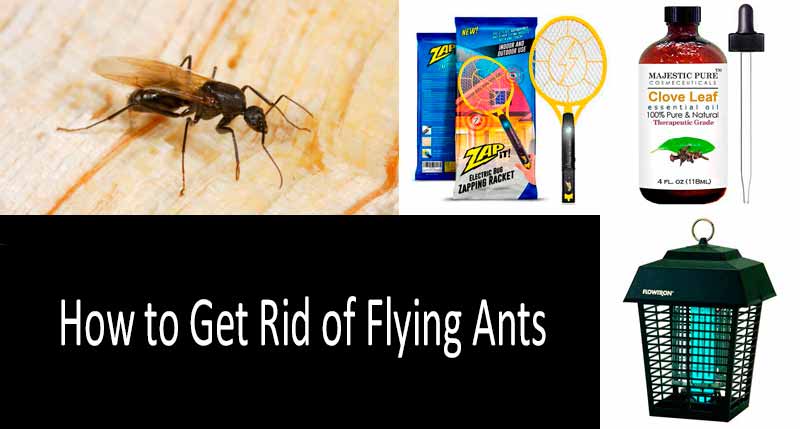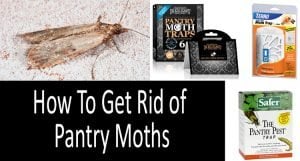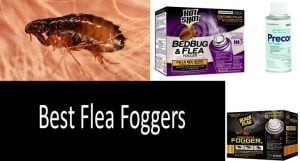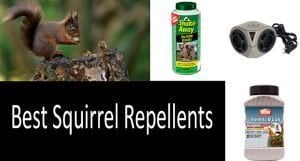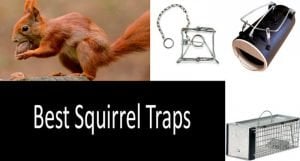Flying ants appear briefly and disappear abruptly. While present, they manage to become very annoying and sometimes even scary. We’ll explain why flying ants are dangerous, how to get rid of them according to the scientists, and which ant control products and express methods are best for use. Don’t put up with ants with wings, they are potential pests!
7 Steps On How To Get Rid Of Flying Ants
First and foremost make up a plan on how to keep these pests away. It may consist of the following steps:
- Sometimes keeping your house tidy is enough to solve the problem. Clean the house, caulk cracks and screen openings, and dispose of food leftovers. Store sweet stuff in closed cans and wipe out grease stains from surfaces in the rooms where food was consumed.
- Use homemade solutions based on peppermint oil and dish soap. A mixture of peppermint oil, water, and soap make flying ants die of suffocation. The dish soap diluted with water kill them through dehydration. Pour the solution in a bottle and spray on these insects whenever you see them.
- Diatomaceous earth is another way to make flying ants die by dehydration. Sprinkle it around the source of food. Once an insect enters the barrier, tiny granules will get stuck in its body and eventually dehydrate it.
- If natural solutions are not effective, apply something more toxic. Kill flying ants on contact using commercially available insecticidal sprays and aerosols. Treat foundations and other areas where these insects have been observed. Any insecticide labeled for ants will be suitable for their flying fellows. Purchase products containing such active ingredients as bifenthrin and deltamethrin, but be sure you check the label regarding their suitability for the indoor use.
- Mount bug zappers both inside and outside the house. These devices attract insects by the bright light and kill them by the electric grid. Zappers designed to be used outdoors should be waterproof and, unlike indoor zappers, can contain chemicals as additional additives.
- Place sticky tapes to trap flying ants on the surfaces where they land to feed. Given that these insects mostly fly, this measure should not be considered as very effective.
- In order to eradicate the entire colony, use poison baits. Slow-acting solutions will be effective in the long run. Once an ant consumes the bait, it will transfer the poison to other members of the colony.
How to make your plan successful? Read a detailed guide covering all scientifically proven methods of eradicating flying ants, what should you know about these insects and what kind of damage they cause. We have also prepared a comparative chart to help you understand how different types of ant killers work.
Know Your Enemy
Flying ants aren’t considered to be a separate species. Ants are known for being polymorphic, i.e. various appearances are acceptable for the same species. Thanks to that, you can find large females, winged males, smaller workers and foragers without wings.
Ants are social insects. Their flying phase signifies the beginning of colonizing the surroundings.
Winged ants are also called swarmers. These emissaries are produced only when the colony has reached a stage where there are resources to spare. Swarmers depart from the established colony on a mission to initiate new colonies. They have very, very slim chances of success. Most die of starvation, dehydration or are eaten by birds, dragonflies or other predators. Although almost all fail, just enough succeed to spread the species and ensure its survival. Departure of the swarmers may mean death to most of them but it does not mean the death of the original colony. Workers in a healthy colony go on about the work of being an ant while building up colony numbers and strength in preparation for the next big swarm, as the experts from the University of Iowa note.

NB! Although the scientists claim that flying ants are simply harmless, beware. You should always be alert as one of these young queens is about to create her own colony somewhere at your place.
Typically, females of the most common species have wings, and among certain types of ants, males can be both winged and wingless. They fight each other for the right to mate with young females in their home nest.
Flying insects that have just hatched from their pups come to the surface. Males fly first. They exude pheromones all over the place inviting the females to mate. Some of the less active females often can’t even take off and so they simply climb higher points, grass, bushes, trees and house walls to start off flying. Ants with wings mate both in the air and on the ground.
Once the mating season is over, a female will look for a place to create a new colony. It is at that time when she is the most dangerous as she can settle in the garden or at home, depending on the species, and can create a colony right near you. A female chews off her own wings, digs a first trench for the future colony and lays eggs. She takes care of the first brood herself. First foragers are small and weak, but despite this, they begin working: they look after the queen and brood, expand the anthill, look for food and protect the colony when needed. Females live an extraordinarily long time for insects: their life span can reach 20 years. However, a female will no longer come to the surface and will procreate for the rest of her life using the same sex cells of one or several males taken at the very beginning for further fertilization.
The males’ fate is unenviable. Once they fulfill the mission Mother Nature has assigned them, they die within a few weeks after hatching their pup.

Many people confuse flying ants with termites as their life cycles are similar. Indeed, the representatives of both species seem to be alike before they lose wings, but the ants have a better expressed thoracic body segment and, to a lesser extent, abdominal segment. Ants’ wings are more transparent and have rare and large veins. Texas A&M University experts present the contrast between the two species in a chart below:
| Winged ants | Winged termites |
| Two pairs of wings, with the hind wings shorter | Two pairs of wings of equal size and shape |
| Antennae usually are «elbowed» | Hair-like antennae |
| Narrow «waist» between abdomen and thorax | No narrow «waist» |
How to Get Rid of Flying Ants: a Review of Scientifically Proven Methods
Large-scale invasions of flying ants on a small territory signify the presence of an entire colony nearby. They are safe for your household on their own. Far from all individuals that have left the nest to mate will be able to meet and then found a colony. But you need to carefully watch their movements near your house and at home. A female will secretly create a new colony without you knowing.
Carpenter ants can establish a colony straight in a house wall if it is made of wood, in the furniture and other wooden structures. Unlike termites, they live in the wood and don’t consume it. Their appearance is larger than that of termites and their bodies have a different shape.
The scientists believe that it is useless and senseless to use radical measures against flying ants. It is enough to clean up regularly, watch the sanitation of your house and its surroundings, and avoid piles of garbage and leftover food. If you are particularly bothered by the swarms of ants with wings attempting to fly into your house, resort to mosquito nets.
The University of California specialists recommend the following measures. Indoors, eliminate cracks and crevices wherever possible, especially in kitchens and other food-preparation and storage areas. You should also store attractive food items such as sugar, syrup, honey, and pet food in closed containers that have been washed to remove residues from outer surfaces. Rinse out empty soft drink containers or remove them from the building. Make sure you thoroughly clean up grease and spills. Remove garbage from buildings daily and change liners frequently.
How Ant Killers Work
| Type | Active Ingredients | Action | Best Use |
| Liquid insecticide | Bifenthrin, Gamma-cyhalothrin, Deltamethrin | Kills on contact and creates a protective barrier around the house. | Use outdoors or indoors. Pour into mounds, treat foundations and spray in the insects’ activity areas. |
| Granules | Acephate, hydramethylnon | They destroy an outdoor colony and prevent new pests from appearing. | Use outdoors for broadcast treatment, pour it around the mound and along the trails. |
| Foam and sprays | Fipronil | Will kill an inaccessible colony within a few days. | To be sprayed on nests in the walls. |
| Poison baits (bait stations) | Fast-acting: Indoxacarb Slow-acting: hydramethylnon, fipronil, boric acid (borax) |
The most effective method that can eliminate the entire colony. It is effective within 3-5 days (fast-acting), 1-5 weeks (slow-acting). | Use indoors or outdoors in the areas of insects’ activity and around their mounds. Ants are finicky and they change their preferences often so you will likely have to switch bait types several times. |
| Diatomaceous Earth | Organic insect killer | Contact action: the particles cut the insects’ exoskeleton and cause dehydration. | Use indoors, spray along the trails and in the insects’ activity areas. |
| Boric acid (dust) | Low-toxic insect killer | Slow-acting stomach poison. | Use indoors, spray along the trails, down the cracks and shelters. |
| Limonene | Citrus essential oils ingredient | Impacts the CNS, causing paralysis and death of insects. | Can be used near food. |
| Oils and Natural sprays | Clove, peppermint, geranium, cinnamon leaf oils | Contact action and certain repelling effect. | Are conditionally safe, i.e. they can be used for treating any areas and creating a protective barrier around your house. |
| IGR | Pyriproxyfen | Highly effective: sterilizes the queen and therefore will remove the colony completely. | Use indoors or outdoors: spray mounds and trails. A very slow-acting product (is effective at least after a month), so be patient. |
5 Best Ant Control Products to Use
An express-method is to mix boric acid (or borax) and sugar with water and create DIY killer slow-acting stomach poison bait. Once inside an insect, it will cause death by depletion. Treat your unwanted guests with this poisonous mixture and they will share it with their nest-mates. Just hope that the females in the colony will die before they have a chance to create a new colony and lay eggs there. The most popular and accessible boric acid today is the PestGuard Zap-A-Roach Boric Acid (2-pack).
Use essential oils as repellents, but make sure you dissolve them in water beforehand. Peppermint, clove, rosemary, thyme, citrus oils are useful for repelling insects. Clove oil is especially valuable as its active ingredient, eugenol, has an immediate effect on pests. You can obtain a bottle of clove oil, such as 100% Pure Clove Essential Oil by Majestic Pure, dissolve it in water and treat window frames and doors so that the insects cannot fly into your house. You can also cast a protective barrier along the outer perimeter of your house with this mixture. Price: Clove Essential Oil: Check current price
Arm yourself with an electric fly zapper. The insects will be electrocuted, but you will have to work hard to slam ants with no wings with this device. If there are too many of them, this will hardly be helpful. It will be handy, though, if you need to kill individual insects and if you apply proper skill. In addition, you will also kill mosquitoes and flies at the same time. The best selling electric fly swatter Zap-It! Bug Zapper is charged through USB and has a lifetime replacement warranty. Price: Check current price
An indoor or outdoor bug zapper can be a real salvation. It will deal with all the flying insects, such as flies, sand flies, midges and other gnats perfectly. They are attracted by the zapper’s lamp light and are electrocuted with its electric grid. Bug zappers are safe for humans and don’t exude any harmful odors, as no chemical baits are used for attracting the insects. The most cut-rate and powerful product for killing flying ants outdoors is the #1 Best-selling Flowtron BK-15D Electronic Insect Killer (Check current price). If they have already managed to penetrate your house, invest into the Aspectek 20W 6000sqft Coverage Zapper (Check current price).

What Comes Next?
Having fly ants is a sure sign that there is a mound somewhere close. You need to be alert as one of the young queens is about to create her own colony on your territory. It means that it is time to buy insecticides and begin treatment. Control methods and products will depend on the species that have infested your lot.
Low-toxic organic insecticides, slow & fast acting baits, dusts and sprays are considered to be the most effective ones.
If you know which particular type has infested your house, read our guides:
5 Flying Ants Control Products Comparison Chart
| Product | Active Ingredient | Action | Where and How to Use | Price |
| PestGuard Zap-A-Roach Boric Acid (2-pack)
|
Boric acid (slow-acting stomach poison) | Causes insects’ death by depletion | To be poured in insects’ activity places | |
| 100% Pure Clove Essential Oil
|
Clove Essential Oil (Eugenol) | Contact activity, partial repelling effect | Dissolve in water and draw a line along the perimeter of the house or yard. | |
| Zap-It! Bug Zapper
|
A manual electric fly swatter | Electrocutes insects on contact | Outdoors and indoors | |
| Flowtron BK-15D Electronic Insect Killer
|
Outdoor bug zapper | Electrocutes insects on contact | For outdoor use only, 25 feet away from people | |
| Aspectek 20W 6000sqft Coverage Zapper
|
Indoor bug zapper | Electrocutes insects on contact | Can be used anywhere indoors |
{code 416}
{code 118}

